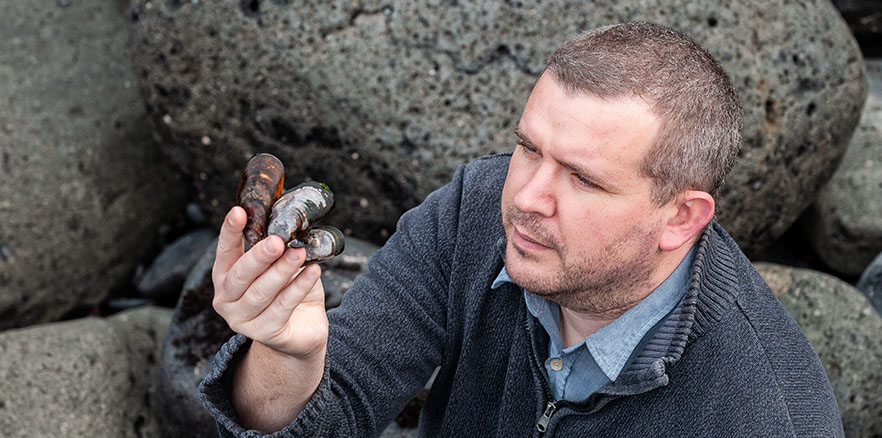
Dr Nathan Kenny
Some green-lipped mussels should be able to tell us how we can mitigate the effects of climate change on these molluscs and improve their productivity.
Dr Nathan Kenny (Biochemistry) is leading a research project investigating genetic methods of mitigating the more pernicious effects of climate change on green-lipped mussels.
Kenny (Te Ātiawa and Ngāi Tahu) and his team are looking into the genetic basis of the resilience that some green-lipped mussels have against climate change-induced heat shock and ocean acidification eating away at their shells.
“Fortunately, there is variation in the population out there, and some green-lipped mussels are better at surviving climate change and its effects,” Kenny explains.
“I am interested in what it is about the genomes of the ones that are good at surviving that enables them to do that, while others die.”
“I am interested in what it is about the genomes of the ones that are good at surviving that enables them to do that, while others die.”
In doing so, he is taking advantage of emerging genetic and molecular tools such as single-cell sequencing, focusing on the earliest stages of the life of the shellfish, to acquire a thorough understanding of the development of these resilient traits.
Kenny says the research should enable the breeding of mussels that possess this natural resilience, and not only help lessen the effects of climate change on the molluscs, but also further improve aquaculture productivity, a bit like animal husbandry for shellfish.
For the lecturer and research group leader, the research is purely altruistic: the self-described “ecological footprint vegetarian” doesn't eat mussels, although he appreciates their commercial, environmental and cultural value.
The green-lipped mussel aquaculture industry is currently worth more than $500 million per year to Aotearoa New Zealand's economy, with big plans for expansion; the bi-valves play key roles in water filtration and the food chain; and kuku or kūtai, as they are known in te reo Māori, are a taonga or treasured species for Māori.
With this in mind, the project embraces collaboration with iwi and recognition of iwi as kaitiaki (guardians) of the research data.
The project has brought Kenny's career full circle. He graduated from the University of Otago with an honours degree in Genetics, before completing a doctorate in Zoology at Oxford University, followed by postdoctoral work at the Chinese University of Hong Kong, the Natural History Museum in London, and Oxford Brookes University.
He returned to Otago last year to take up a five-year Rutherford Discovery Fellowship, under which he is carrying out the mussel research project that continues his overriding interest in comparative changes in genomes that allow organisms to live in particular environments.
He says the presence of Genomics Aotearoa in the Biochemistry Department was a powerful magnet drawing him back to Otago and is of major assistance to the research.
Kenny's research team comprises PhD student Hannah Greenhough; postdoctoral fellow Dr Katerina Achilleos; and assistant research fellows Mary Hawkes and Louise Walker.
The team is working closely with the Cawthron Institute in Nelson, and with the industry-based Shellfish Production and Technology New Zealand Limited (SPATnz).
Recent awards
- Genomics Aotearoa Indigenous Genomics Platform grant (2022)
- Marsden Fast-Start award (2021)
- Rutherford Discovery Fellowship (awarded 2020, begun 2021)
- Marie Curie Fellowship at the Natural History Museum, London (2017)
- Clarendon Scholarship at St Cross College, Oxford (2010)
Funding
- Rutherford Discovery Fellowship
- Marsden Fund Fast-Start Grant
- University of Otago Research Grant
More stories about early career researchers
This story is part of the research publication 'He Kitenga 2022: Talented Futures', which presents the different pathways into research that early career researchers follow.
